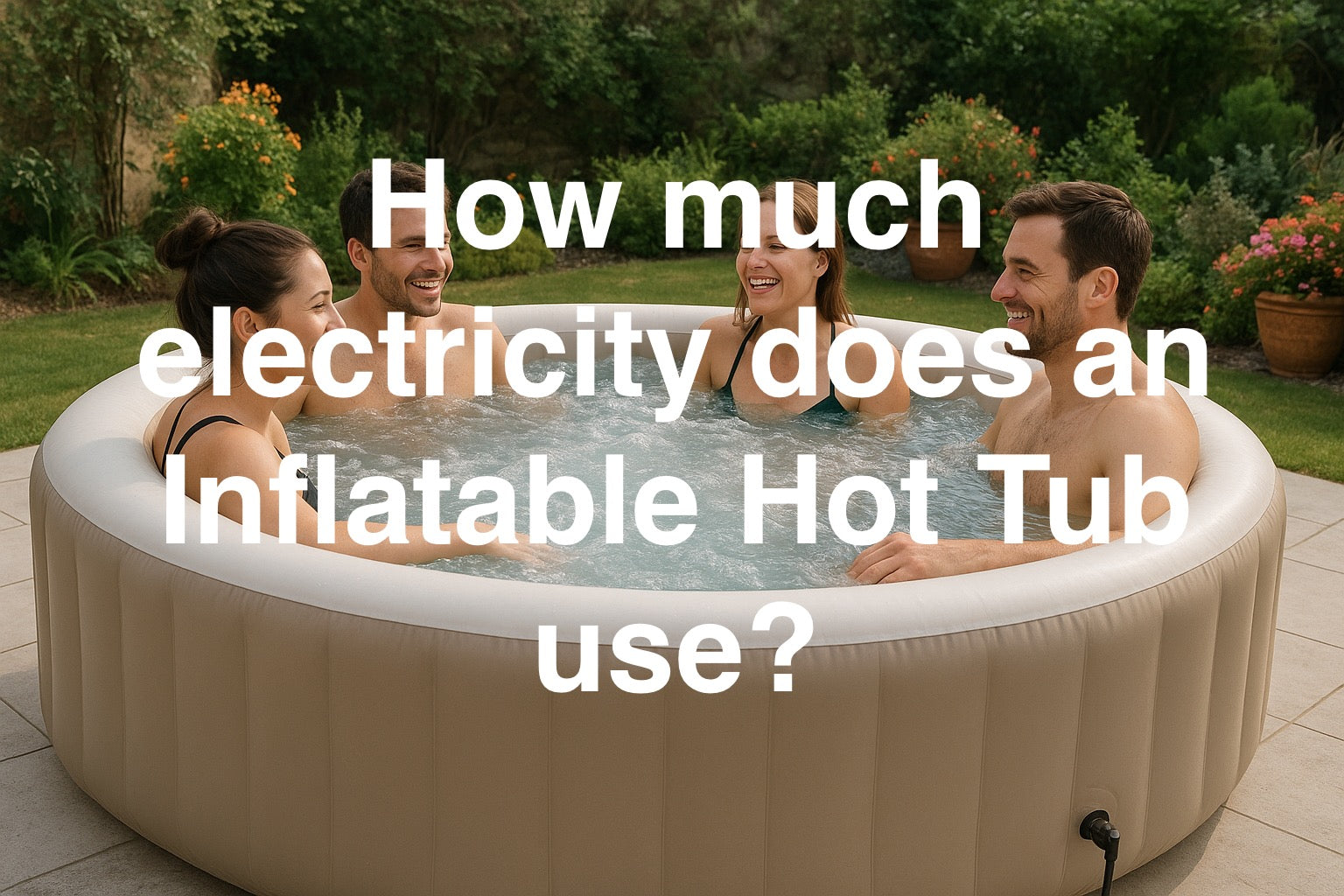
How much electricity does an Inflatable Hot Tub use?
Picture this: it’s a chilly evening, the kids are in bed, and you’re sinking into a bubbling inflatable spa with a well-earned cuppa. Bliss, right? But then the thought creeps in… how much is this soak costing me in electricity?
Here’s the short answer: inflatable hot tubs usually cost between £35 and £60 a month to run in the UK. The exact figure depends on things like temperature, insulation, and how often you use it.
Keep reading and you’ll not only find out what affects those costs but also discover simple tricks to keep your bills from bubbling over.

Average Electricity Usage and Cost
Daily and Monthly Averages
Most inflatable hot tubs pull 1.5 to 3 kWh per hour when heating. That usually works out at around 3.5–6 kWh per day.
At the UK’s average electricity rate (34p per kWh), you’re looking at roughly £1.20–£2 per day. Over a month, that’s £35–£60—about the price of one takeaway a week.
Calculating Your Own Running Costs
Here’s the simple formula to work it out yourself:
Daily kWh usage × Your electricity rate per kWh × Number of days in the month
Example: if your spa uses 4 kWh daily at 34p per kWh = £1.36 a day. Multiply that by 30 days, and you’re at £40.80 per month.
It’s not free—but for nightly stress relief, many say it’s worth every penny.
Key Factors That Influence Electricity Usage
Outside Temperature and Climate
Cold weather is the biggest culprit for high bills. In winter, your tub works overtime just to keep the water warm, while in summer it can almost do the job itself.
Frequency and Duration of Use
A quick dip now and then is cheap. But if you’re hosting the neighbours every evening for a soak and chat, expect your meter to spin faster.
Insulation and Hot Tub Covers
A sturdy, insulated cover is worth its weight in gold. It keeps the warmth in, the leaves out, and stops your money from literally evaporating.
Temperature Setting
Every degree matters. Keeping your tub at a constant 40°C may feel luxurious, but it will show up on your bill. Even dropping it by two degrees can make a noticeable difference.
Hot Tub Size and Water Volume
The bigger the tub, the more water to heat. It’s simple maths: more litres = more kilowatts = more cost.
Jet Usage
Jets feel amazing, no question. But they also draw extra power. Use them for a relaxing burst, not all night long.
How to Reduce Your Inflatable Hot Tub's Energy Costs

Improve Insulation
Think of insulation as a winter coat for your tub. Add a thermal cover, ground mat, or even a side jacket. The less heat that escapes, the less often your heater kicks in.
Optimise Your Usage Habits
Little changes add up. Try using the tub at slightly lower temperatures, avoid marathon sessions with the jets on, and if you’ve got an off-peak tariff, soak when energy is cheaper.
Use a Timer
Timers are brilliant for keeping control. Heat the tub only when you need it, instead of paying to keep it hot around the clock.
Inflatable vs. Hard-Shell Hot Tubs: A Comparison of Energy Use
Energy Efficiency and Heating Times
Inflatable spas don’t hold heat quite as well as hard-shell tubs because they’re less insulated. On the plus side, they usually hold less water, so they heat up faster.
Wattage and Power Consumption
Inflatable models typically use 1.5–3 kWh per hour, while traditional hard-shell hot tubs can gulp down 3–6 kWh per hour. For families or casual use, inflatables are often the more budget-friendly option.
Conclusion & Key Takeaways
Running an inflatable hot tub does cost money, but it doesn’t have to be eye-watering. On average, you’ll spend £35–£60 a month, and with a few clever habits—like better insulation, smart temperature settings, and using a timer—you can keep costs down without sacrificing your soaks.
Takeaways:
-
Expect to pay around £1.20–£2 per day in electricity.
-
Cold weather and frequent use push bills up.
-
Insulation, timers, and small temperature tweaks are your best money-savers.
-
Inflatable spas are cheaper to run than hard-shell tubs for casual use.
So, is it worth it? If stress relief, family time, and cosy nights under the stars sound good, then absolutely.
Have you checked out our other posts?
Is It Cheaper To Leave An Inflatable Hot Tub On All The Time?
How Much Does An Inflatable Hot Tub Cost To Run In The UK?
How Many Hours A Day Should I Run My Inflatable Hot Tub?
How Can I Save Energy With An Inflatable Hot Tub?
How Heavy Is A Full Inflatable Hot Tub?



Leave a comment